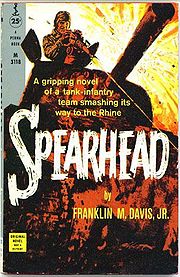
Permabooks
Encyclopedia

Promoted with the slogans Books of Permanent Value for Permanent Use and Books to Keep, the early Permabooks were priced at 35 cents. They did not feature the flexible covers usually associated with paperback books. Instead, as the name implies, the first Permabooks were designed in a more durable format with board covers. The interior looked like a paperback, but the exterior, measuring 4⅜" wide by 6½" deep, gave the impression of a reduced-size hardcover. The edges of the stiff, unflexible board cover extended 1/8" past the trim of the interior pages.
The concept was heralded in a back cover blurb:
- Permabooks combine the virtues of handiness for the pocket and durability for the library shelf. They are selected with care to provide reliable books for education and recreation. Each has been printed from new plates and bound in boards with special wear-resistant finish.
The initial format only lasted three years, with Doubleday switching to the standard paperback appearance in 1951, as indicated by Hyde Park Books' breakdown of the numbering sequence:
- The binding influenced editorial decisions. There was no sense publishing a durable book that no one had reason to keep, so the first titles were Best-Loved Poems, How to Write Letters, Best Quotations for All Occasions and other reference-style works. The numbering sequence: P1-P92, hardbacks; there was no P93; P94-P97, hardbacks; P98, paper; P99-PlOl, hard; P102 on were all paperback. Plus, PS, P7, P25, P65, P89 were re-issued as paperback without being re-numbered. In 1954, the company was purchased by Pocket Books, which began numbering Permabooks with M1OOO, skipped to M1600, skipped for the third title to M2001, skipped yet again to M3002 for the fourth title, and then numbered sequentially until M5014, when it jumped to M7500.
The Perma Star imprint began in 1952. Perma Special, which also began that year, was a higher quality line selling for 50 cents. These imprints included originals by Richard Stark (a Donald E. Westlake
Donald E. Westlake
Donald Edwin Westlake was an American writer, with over a hundred novels and non-fiction books to his credit. He specialized in crime fiction, especially comic capers, with an occasional foray into science fiction or other genres...
pseudonym) and Ed McBain (pseudonym for Evan Hunter
Evan Hunter
Evan Hunter was an American author and screenwriter. Born Salvatore Albert Lombino, he legally adopted the name Evan Hunter in 1952...
).
In 1954 Doubleday sold Permabooks to Pocket Books
Pocket Books
Pocket Books is a division of Simon & Schuster that primarily publishes paperback books.- History :Pocket produced the first mass-market, pocket-sized paperback books in America in early 1939 and revolutionized the publishing industry...
, Inc., which kept the Permabooks name as one of their imprints, issuing both originals and reprints.
Partial list of the 1948-49 Permabooks

- P1 Best Loved Poems edited by Richard Charlton MacKenzie, 1948
- P5 The Standard Bartender's Guide by Patrick Gavin Duffy, 1948
- P6 Sex and the Love Life by William J. Fielding, 1948
- P8 The Stainless Steel Kimono by Elliott Chaze, 1948
- P10 The Conquest of Fear by Basil King, 1948
- P11 How Shall I Tell My Child? A Parent's Guide to the Sex Education of Children by Belle S.Mooney, 1948
- P15 Blackstone's Tricks Anyone Can Do by Harry Blackstone, 1948
- P17 The Handy Encyclopedia of Useful Information by Lewis Copeland (editor). Research Editors: Robert Rahtz, Leonard D. Abbott, Paul Doring
- P20 Mathematics for Home and Business by William L. Schaaf, Ph.D.
- P34 The Handy Book of Hobbies by Geoffrey Mott-Smith, 1949
- P40 Stop Me If You've Heard This OneStop Me If You've Heard This OneStop Me If You've Heard This One was a comedy radio series, created by the actor-humorist Cal Tinney and sponsored by Quaker Oats. Hosted by Milton Berle, it aired Saturday evenings at 8:30pm on NBC beginning October 7, 1939.-Production history:The premise was that listeners received prizes for...
by Lew LehrLew LehrLew Lehr was a comedian, writer and editor known for his humorous contributions to Fox Movietone News, his radio appearances and his popular catchphrase, "Monkeys is the cwaziest peoples."...
, Cal Tinney and Roger Bower, 1949 - Common Errors in English and How to Avoid Them by Alexander M. Witherspoon, Ph.D.
- Best Quotations for All Occasions edited by Lewis C. Henry
- Ida Bailey Allen's Cookbook by Ida Bailey Allen
- How to Write Letters for All Occasions by Alexander L. Sheff and Edna Ingalls
- Best Jokes for All Occasions edited by Powers Moulton
- Eat and Reduce! by Victor H. Lindlahr
Sources
- Davis, Kenneth C.Kenneth C. DavisKenneth C. Davis is an American popular historian, best known for his Don't Know Much About... series. Born in Mount Vernon, New York, Davis attended Concordia College, Bronxville in New York, and Fordham University at Lincoln Center, New York City...
Two-Bit Culture: The Paperbacking of America, Boston: Houghton Mifflin, 1984.

